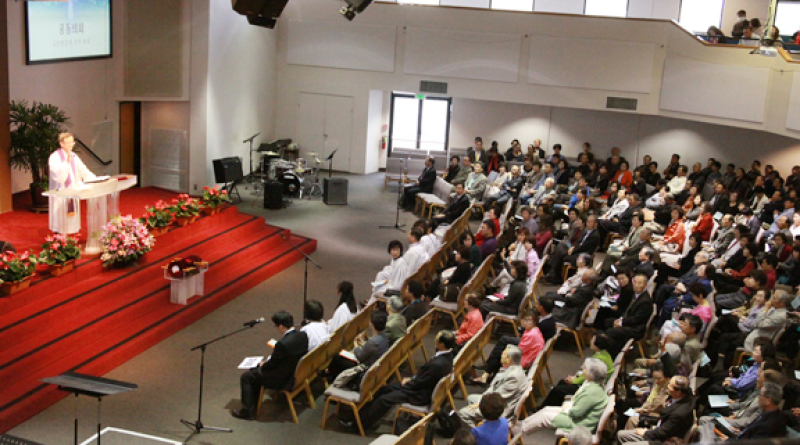
Good Shepherd Presbyterian Church of ECO decided to give up its church property at Rowland Heights worth $6.35 million and to purchase and move into a new church building in Chino Hills. The church was originally a part of the PCUSA (Presbyterian Church, U.S.A.) but recently left the denomination to join the ECO (Covenant Order of Evangelical Presbyterians) due to disagreements with the PCUSA's acceptance of same-sex marriages.
This church, which is a part of the San Gabriel Presbytery, was following the presbytery's Gracious Dismissal Policy (GDP) to be dismissed, and held a congregational vote in March of 2014 with the presbytery's agreement. 91 percent of the congregation voted to be dismissed from the congregation.
However, the presbytery ultimately did not accept the vote as valid and revised the GDP, placing the church's dismissal process on hold. The church held another congregational vote a year later, at which point 95 percent voted to leave the denomination, and that majority left to the ECO thereafter. The San Gabriel Presbytery and the congregational minority that remained in the denomination then filed a lawsuit against the ECO congregation on July 9 with the Los Angeles Superior Court, asserting that they were unlawfully using the church property.
Reverend Tae Hyung Ko, the senior pastor of the ECO congregation, said before the congregation on Sunday that the church will give up the property and move into a new building.
"I wrestled with how we can best give glory to God throughout this process," Ko said. "I wanted a win-win situation for both of us who want to leave the denomination, and those who want to stay in the PCUSA, and suggested giving $1.28 million in offering to the presbytery. But they responded differently."
In response to the question, "Why are you giving up the property that you have been defending up until now?" Ko said, "Unlike the misunderstandings of many people, we weren't trying to keep the property. We wanted to converse as fellow Christians, and wanted to find a way that the minority group that wants to remain in the PCUSA would also be able to flourish. But if we go into civil court, it just becomes a fight between Christians, so we decided to give up the property."
This new church property is currently owned by The Wesleyan Church, and is worth some $20 million. It was previously used by another Korean congregation -- Crossroads Korean Church. Good Shepherd will be purchasing it for $13 million. The property, which was built six years ago, stands on a four-acre plot of land, and is some 40,000 square feet in size. 500 people can worship together in the sanctuary, and there is enough parking space for 160 cars.
"We didn't immediately have a location where all 1,000 of us could worship together at the same time," Ko said regarding the decision. "But the session decided that we didn't want to fight in civil court, and decided to give up the property. Since then, we started looking into schools, warehouses, and all other possible locations. And then a completely unexpected road opened up."
Good Shepherd will hold a congregational on Sunday regarding the members' thoughts on the move. "On September 13, we had an open house event at the new building in Chino Hills, and more than 300 church members came, and they showed a lot of support and approval," Ko said.
Meanwhile, an increasing amount of Korean churches have expressed that they would leave the PCUSA even if they have to give up their church properties. Zion Presbyterian Church of the Sacramento Presbytery recently decided to be dismissed from the denomination even if they have to give up their property worth $3 million, and Capital Korean Church of the same presbytery also said the congregation and its leaders are discussing leaving the denomination on the understanding that they also may lose their property.
Good Shepherd was one of the largest Korean churches in the PCUSA, and Ko also was the president of the National Council of Korean Presbyterian Churches. As a result, the church's decision this time around will likely be a significant influence to other Korean churches.



















